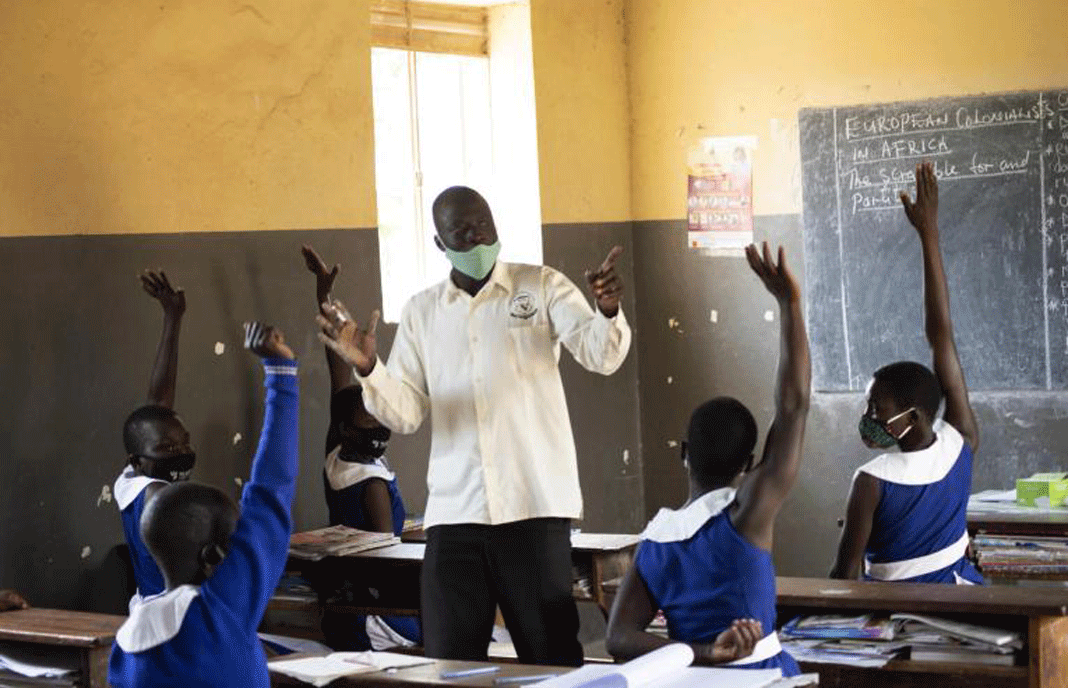Prime
Govt invites teachers for talks as strike starts

A teacher conducts a lesson in Uganda during the Covid-19 era. PHOTO/FILE/COURTESY
What you need to know:
- UNATU leadership says strike will go on as planned.
The government yesterday invited disgruntled teachers for talks and rebuked the planned strike over “discriminatory salary enhancement”.
Speaking on the eve of a nation-wide teachers’ strike, the State Minister in charge of Primary Education, Dr Joyce Kaducu, however, did not give any details of the planned dialogue with Uganda National Teachers Union (Unatu).
“What we want from teachers is dialogue,” Dr Kaducu said before she warned striking teachers against frustrating the implementation of revised curricula.
ALSO READ: Plan better to avoid strikes
Dr Kaducu, who represented the First Lady and Education minister, Ms Janet Museveni, was officiating at the National Curriculum Development Centre’s pre- 50-year anniversary event in Kampala.
She reiterated that teachers as professionals should always opt for dialogue in resolving conflicts instead of resorting to strikes since they disrupt effective learning.
“Our doors are open…We love the teachers and we don’t want to see them go into industrial action. Going into industrial action will mean setting back the entire education system in terms of curricula implementation. We are appealing to the teachers not to go into industrial action. Present your case to us and we get a way forward,” Dr Kaducu said.
“We have just started implementing the lower secondary curriculum that requires intensive implementation and continuous running of the implementation programme. We have seen the messages from teachers circulating on social media and press statements. Once they go on strike, we are going back to square zero. We have been out of school for two years. Now again to go on strike is a setback,” she added.
ALSO READ: Let’s rethink pay for science teachers
The NCDC will celebrate its 50th anniversary in March next year under the theme: “Quality curriculum for National Transformation.”
Dr Kaducu said the abridged curricula for primary and secondary schools as well as the revised curriculum for lower secondary, which is competence based can only be successful if teachers are committed to implementing it as planned.
The government rolled out the new lower secondary education curriculum in February 2020 with the aim of enhancing skills training.
The government is also in the process of reviewing the A-level curriculum to ensure that graduate acquire skills that are required in the 21st century.
She said the government values all teachers and that no one will be left behind as far as salary enhancement is concerned.
“They are talking about equity in rolling out salary enhancement. They say that scientists are preferred as opposed to Arts teachers. I think they are perceiving it in a wrong angle because enhancement will cater for all professionals but we are starting with the scientists this financial year. The Arts teachers will be catered for in the next financial year. We are leaving no teachers behind, ”Dr Kaducu said.
She said the ministry’s goal is to enhance all teachers’ salaries but since the resource envelop cannot enable government to adequately roll it to every teacher, enhancement will be done in a phased manner.
The teachers have vowed to lay down their tools today over what they described as proposed discriminatory salary enhancement.
“The leadership of the teachers’ union countrywide has unanimously ratified the resolution of the standing committee that sat on May 23 to enter into an industrial action effective June 15 if there is no satisfactory feedback on the issues pertaining to teachers’ salary increment across the board for financial year 2022/2023,” said Unatu in a June 11 statement signed by its general secretary, Mr Filbert Baguma.
When asked yesterday whether Unatu would call off the strike as requested by the ministry, Mr Baguma said the strike will go on as planned.
Mr Usher Owere, the chairperson of National Organisation of Trade Unions, yesterday welcomed the calls for talks and maintained that the strike will go on as planned and reiterated that the decision to call it off will depend on the outcome of the talks.
In her speech read by Dr Kaducu, Ms Museveni said government emphasises human resource development as one of the key tool for social and economic development.
“The key outcome of the curriculum is manifested in the current products. The system must produce cadres and individuals who can excel globally. The performance of Ugandans has been quoted across the globe as a country with a strong education system, “She said.
The director of the National Curriculum Development Centre, Dr Grace Baguma, emphasised the importance of instructing leaners at lower primary using local languages to effective comprehension of what they are taught.




